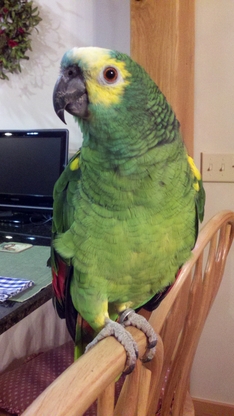The heart health of pet birds is essential to their long life

Lorrie Shaw | Contributor
If you have a bird as a pet, you’re already acutely aware of their special needs when it comes to diet and exercise. In that respect, they are no different than us humans or other pets.
I’ve previously discussed ways to use fresh, healthy food not only for nourishment, but as an enrichment toy that will help nourish their brains, too.
One thing that you might not know about birds is that their hearts are uniquely different than that of mammals; for one thing, they are larger, considering an avian’s relative size. They also beat faster. To match that, their blood pressure is higher.
Amazingly athletic, birds have a superior blood supply to their heart muscle and if these animals are kept in really good condition, that muscle will serve them well and that’s essential, considering their longevity.
It’s my best guess that birds in the wild live more healthy lives for one good reason: their lifestyle — they get more exercise because they need to forage for food. (Most bird owners, exotic or otherwise, feed their avians a species-appropriate diet that includes plenty of fresh food.)
In captivity, that can pose a challenge because of the lack of space they are afforded, compared to what they have while living in the wild.
Captive birds have been known to develop heart disease, usually atherosclerosis, a buildup of plaques inside the blood vessel, which unfortunately occurs most often in African greys. However, it can occur in any species.
Being overweight puts birds at risk, too. (Yes, birds can be chubby.)
Older birds are the ones typically diagnosed with heart disease, but that doesn’t mean that birds of other ages can’t develop it. It can be life threatening no matter the age or species. Just as in humans, an inefficient heart can’t pump blood to other vital organs like the kidneys and liver very well, leading to more problems.
Heart disease is diagnosed much in the same way as it is in humans, through blood work, tests and, of course, a good physical exam.
The best way to help stave off the disease, as you might have guessed that I‘d say, is exercise. (Sound familiar?)
The heart is a muscle, and a powerful one. If a bird has regular activity, it can remain strong and healthy. But for some bird owners, what exercise really means can be confusing, and for good reason — being in captivity limits what a bird is meant to do, physically speaking.
Flying is by far the best exercise for birds. If it’s not something that can be done in your home, you can do something called wing flapping with your feathered friend. (This does require an immense amount of trust from your bird and they should be used to being handled with no problem.)
Most enclosures these days are spacious and have space for play gyms to be installed, if they don’t come with one. These gyms offer swings, toys and tools that they can manipulate with their bodies — good for both body and mind.
Birds are expert climbers and love to make their way up and down a bird ladder that’s installed.
Before changing up your bird’s diet and activity plan, be sure to check with your avian vet to be sure how to approach this new territory.
To learn more, click here to read a more in-depth article on bird heart health by Margaret A. Wissman, DVM.
Lorrie Shaw leads the pets section for AnnArbor.com. Connect with her on Google + or e-mail her directly.


Comments
Billy
Thu, Aug 23, 2012 : 4:20 p.m.
If your bird is in captivity to the point that it doesn't get healthy exercise....the you shouldn't have that bird...period. Sorry. This means you can't provide what that bird needs. Large exotics should NOT be pets for most people because they can't provide them the amount of attention they need. If you have to go to work and leave your large exotic bird home in a cage all day....then you should DEFINITELY not have that pet. You shouldn't even do that with a dog to be honest. Do YOU want to spend 8+ hours a day during your active and waking hours locked in a crate/cage? Even some of the smaller hookbills have a level of intelligence that caging them all day long is borderline torture. People seriously underestimate the sentience level of exotics.